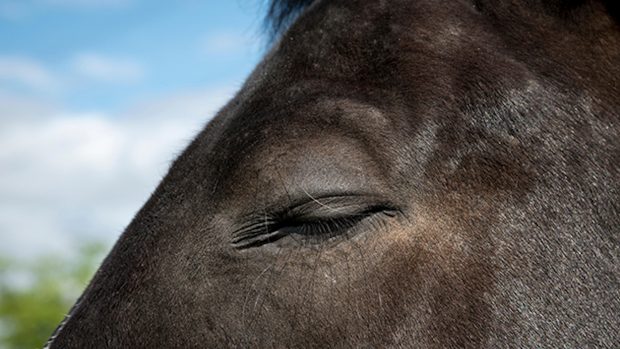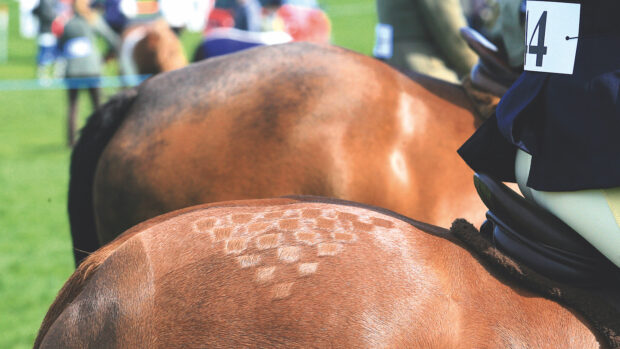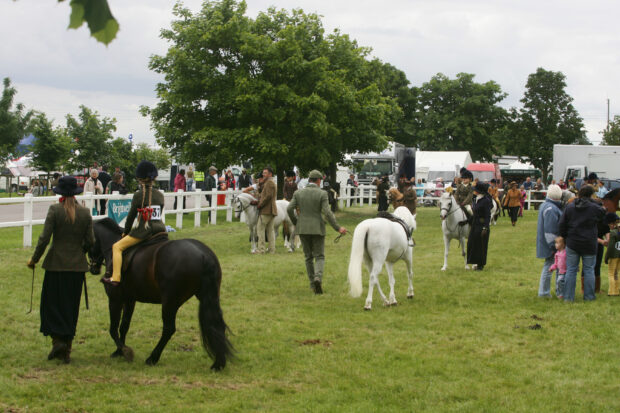An owner who found her increased weight was making her horse uncomfortable has vowed not to ride again until she has lost three stone.
Vicky Spence said her physio found sore areas on her 15hh traditional gypsy cob Lacey-May’s back.
“Her saddle fitted fine and she hadn’t had any problems when I was lighter so there was only one thing it could be,” Vicky told H&H.
“But when I asked the physio if it was because of me, she stumbled a bit. I said: ‘Come on, I’m a big girl, I can take it.’ And she said yes, it probably was.
“That doesn’t make me want to lock myself away and eat Maltesers; it makes me want to do something about it, and be able to ride my horse.
“In the mean time, she’s had her shoes off, she’s out in the field with her herd having a marvellous time until I’m light enough to ride her. Then hopefully she can be ridden for the rest of her life, rather than breaking in a few years’ time.”
Vicky said Lacey-May, now eight, underwent surgery last year for proximal suspensory desmopathy (PSD), and that her rehabilitation this year involved a lot of long-reining and in-hand walking.
“So I lost a lot of weight, and felt much better for it, but then I started riding her again instead,” she said.
“I had an all-inclusive holiday, generally came off the wagon, and didn’t realise the weight was creeping back on until I started having problems.
“Lacey-May’s a stocky girl and I’d have thought she’d be fine and could carry me but clearly not, as there were no problems when I was lighter. People would say ‘Oh she’s fine, she can carry you’, and maybe she can, but not comfortably, and for me that’s the important thing.”

Vicky commented on an H&H post about rider weight to share her story, and says she was overwhelmed by the support and positive comments from readers.
“It’s not fat shaming, it’s animal abuse,” she wrote. “If you are too heavy, you just are. Sort it out or get another rider for your horse.”
As H&H has previously reported, the scientist behind the rider weight research have always stressed there is no “fat-shaming” involved, it is about ensuring riders are of appropriate weight, and have appropriately-fitted saddles, for the horses they ride.
Vicky agrees.
“Ride a horse who’s appropriate for your size, or find a different rider, or do something about it,” she said. “If you’re too heavy, you need to change something, it’s your responsibility.
“I’ve had my horse since she was a foal and she’s very demonstrative; she lets me know if there’s something wrong. But many horses aren’t like that, they’re prey animals who don’t show pain or discomfort as they’d become targets.
“They’re trained to carry you so many will keep on doing it, even though they’re in pain. Just because something may not look like abuse, doesn’t mean it isn’t.
“I’ve had this horse since she was a foal and I’m not going to ruin her just because I’ve eaten too many pizzas.”
Vicky urged other riders to consider their horses’ behaviour as clues for any possible issues, ensure saddles are fitted regularly, and listen to any relevant professionals’ advice on whether or not they are of appropriate size.
“People say a horse is happy to carry them, but they’re stoic, and that’s what they’re trained to do,” she said. “There’s also talk about being a better rider and yes, of course a balanced rider is better than a heavy, unbalanced one – but you’re not suddenly two stone lighter just because you ride well.”
Continues below…

Excess rider weight can cause lameness
Results of a landmark pilot study show the negative effect heavier riders can have on horse performance

Subscribe to Horse & Hound magazine today – and enjoy unlimited website access all year round

The rider weight debate and why it’s not fat-shaming: H&H responds
H&H responds to the latest news on a big issue for the equestrian industry
Vicky said being able to ride again will be the best motivation when she starts her diet in earnest after Christmas, and as soon as she is able, plans to start long-reining Lacey-May, which will benefit the horse in terms of fitness, while also meaning more exercise for herself.
“At the moment, I can’t walk far because my knees hurt, I can’t walk up the field because I get out of breath” she said. “But once I’ve lost enough weight, we’ll be able to start getting fit together. We both need to be in a better place so we can move forward with our dreams.”
Have you worked to reduce your weight and/or improve your fitness specifically to benefit your horse? Or have you been told by an equestrian professional, such as a trainer, physiology that you need to do so? Let us know about your experiences by writing to hhletters@ti-media.com for a chance to see your views in H&H magazine and you could win a bottle of Champagne Taittinger (please include your name and address; letters may be edited).




